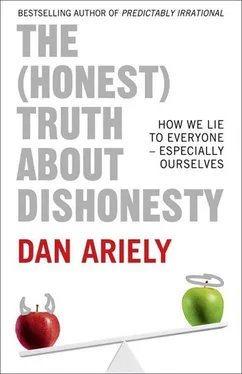Ariely, Dan - The (Honest) Truth About Dishonesty - How We Lie to Everyone – Especially Ourselves
Здесь есть возможность читать онлайн «Ariely, Dan - The (Honest) Truth About Dishonesty - How We Lie to Everyone – Especially Ourselves» весь текст электронной книги совершенно бесплатно (целиком полную версию без сокращений). В некоторых случаях можно слушать аудио, скачать через торрент в формате fb2 и присутствует краткое содержание. Жанр: Старинная литература, на английском языке. Описание произведения, (предисловие) а так же отзывы посетителей доступны на портале библиотеки ЛибКат.
- Название:The (Honest) Truth About Dishonesty: How We Lie to Everyone – Especially Ourselves
- Автор:
- Жанр:
- Год:неизвестен
- ISBN:нет данных
- Рейтинг книги:4 / 5. Голосов: 1
-
Избранное:Добавить в избранное
- Отзывы:
-
Ваша оценка:
- 80
- 1
- 2
- 3
- 4
- 5
The (Honest) Truth About Dishonesty: How We Lie to Everyone – Especially Ourselves: краткое содержание, описание и аннотация
Предлагаем к чтению аннотацию, описание, краткое содержание или предисловие (зависит от того, что написал сам автор книги «The (Honest) Truth About Dishonesty: How We Lie to Everyone – Especially Ourselves»). Если вы не нашли необходимую информацию о книге — напишите в комментариях, мы постараемся отыскать её.
The (Honest) Truth About Dishonesty: How We Lie to Everyone – Especially Ourselves — читать онлайн бесплатно полную книгу (весь текст) целиком
Ниже представлен текст книги, разбитый по страницам. Система сохранения места последней прочитанной страницы, позволяет с удобством читать онлайн бесплатно книгу «The (Honest) Truth About Dishonesty: How We Lie to Everyone – Especially Ourselves», без необходимости каждый раз заново искать на чём Вы остановились. Поставьте закладку, и сможете в любой момент перейти на страницу, на которой закончили чтение.
Интервал:
Закладка:
After completing either the easy or the hard Stroop task, each participant was given the opportunity to take a multiple-choice quiz about the history of Florida State University. The test included questions such as “When was the school founded?” and “How many times did the football team play in the National Championship game between 1993 and 2001?” In total, the quiz included fifty questions, each with four possible answers, and participants were paid according to their performances. The participants were also told that once they finished answering all the questions, they would be given a bubble sheet so that they could transfer their answers from the quiz to the sheet, recycle the quiz itself, and submit only the bubble sheet for payment.
Imagine that you are a student in the condition with the opportunity to cheat. You have just finished the Stroop task (either the depleting or nondepleting version). You have been answering the quiz questions for the past few minutes, and the time allotted for the quiz is up. You walk up to the experimenter to pick up the bubble sheet so that you can dutifully transfer your answers.
“I’m sorry,” the experimenter says, pursing her lips in self-annoyance. “I’m almost out of bubble sheets! I only have one unmarked one, and one that has the answers premarked.” She tells you that she did her best to erase the marks on the used bubble sheet but the answers are still slightly visible. Annoyed with herself, she admits that she had hoped to administer one more test today after yours. She next turns to you and asks you a question: “Since you are the first among the last two participants of the day, you can choose which form you would like to use: the clean one or the premarked one.”
Of course you realize that taking the premarked bubble sheet would give you an edge if you decided to cheat. Do you take it? Maybe you take the premarked one out of altruism: you want to help the experimenter so that she won’t worry so much about it. Maybe you take the premarked one to cheat. Or maybe you think that taking the premarked one would tempt you to cheat, so you reject it because you want to be an honest, upstanding, moral person. Whichever you take, you transfer your answers to that bubble sheet, shred the original quiz, and give the bubble sheet back to the experimenter, who pays you accordingly.
Did the depleted participants recuse themselves from the tempting situation more often, or did they gravitate toward it? As it turned out, they were more likely than nondepleted participants to choose the sheet that tempted them to cheat. As a result of their depletion, they suffered a double whammy: they picked the premarked bubble sheet more frequently, and (as we saw in the previous experiment) they also cheated more when cheating was possible. When we looked at these two ways of cheating combined, we found that we paid the depleted participants 197 percent more than those who were not depleted.
Depletion in Everyday Life
Imagine you’re on a protein-and-vegetable diet and you go grocery shopping at the end of the day. You enter the supermarket, vaguely hungry, and detect the smell of warm bread wafting from the bakery. You see fresh pineapple on sale; although you adore it, it is off limits. You wheel your cart to the meat counter to buy some chicken. The crab cakes look good, but they have too many carbohydrates so you pass them by, too. You pick up lettuce and tomatoes for a salad, steeling yourself against the cheesy garlic croutons. You make it to the checkout counter and pay for your goods. You feel very good about yourself and your ability to resist temptation. Then, as you are safely out of the store and on the way to your car, you pass a school bake sale, and a cute little girl offers you a free brownie sample.
Now that you know what you know about depletion, you can predict what your past heroic attempts of resisting temptation may cause you to do: you will most likely give in and take a bite. Having tasted the delicious chocolate melting over your deprived taste buds, you can’t possibly walk away. You’re dying for more. So you buy enough brownies for a family of eight and end up eating half of them before you even get home.
NOW THINK ABOUTshopping malls. Say you need a new pair of walking shoes. As you make your way from Neiman Marcus to Sears across a vast expanse of gleaming commercial temptation, you see all kinds of things you want but don’t necessarily need. There’s that new grill set you’ve been drooling over, that faux-shearling coat for next winter, and the gold necklace for the party you will most likely attend on New Year’s Eve. Every enticing item you pass in the window and don’t buy is a crushed impulse, slowly whittling away at your reserve of willpower—making it much more likely that later in the day you will fall for temptation.
Being human and susceptible to temptation, we all suffer in this regard. When we make complex decisions throughout the day (and most decisions are more complex and taxing than naming the colors of mismatched words), we repeatedly find ourselves in circumstances that create a tug-of-war between impulse and reason. And when it comes to important decisions (health, marriage, and so on), we experience an even stronger struggle. Ironically, simple, everyday attempts to keep our impulses under control weaken our supply of self-control, thus making us more susceptible to temptation.
NOW THAT YOUknow about the effects of depletion, how can you best confront life’s many temptations? Here’s one approach suggested by my friend Dan Silverman, an economist at the University of Michigan who was facing grave temptation on a daily basis.
Dan and I were colleagues at the Institute for Advanced Study at Princeton. The Institute is a lovely place for lucky researchers who can take a year off to do little else besides think, go for walks in the woods, and eat well. Every day, after we’d spent our mornings pondering life, science, art, and the reason for it all, we enjoyed a delectable lunch: say, duck breast served with polenta and glazed mushroom caps. Each lunch menu was accompanied by a wonderful dessert: ice cream, crème brûlée, New York cheesecake, triple chocolate cake with raspberry-crème filling. It was torturous, particularly for poor Dan, who had a powerful sweet tooth. Being a smart, rational, cholesterolically challenged economist, Dan wanted dessert, but he also understood that eating dessert daily is not advisable.
Dan thought about his problem for a while and concluded that when faced with temptation, a rational person should sometimes succumb. Why? Because by doing so, the rational person can keep him- or herself from becoming too depleted, remaining strong for whatever temptations the future may bring. So for Dan, who was very careful and concerned about future temptations, it was always carpe diem when it came to the daily dessert. And yes, along with Emre Ozdenoren and Steve Salant, Dan wrote an academic paper justifying this approach.
ON A MOREserious note, these experiments with depletion suggest that, in general, we would be well served to realize that we are continually tempted throughout the day and that our ability to fight this temptation weakens with time and accumulated resistance. If we’re really serious about losing weight, we should get rid of temptation by clearing our shelves and refrigerator of all the sugary, salty, fatty, and processed foods and acclimating to the taste of fresh produce. We should do this not only because we know that fried chicken and cake are bad for us but also because we know that exposing ourselves to such temptations throughout the day (and every time we open a cupboard or the refrigerator) makes it more difficult for us to fight off this and other temptations throughout the day.
Читать дальшеИнтервал:
Закладка:
Похожие книги на «The (Honest) Truth About Dishonesty: How We Lie to Everyone – Especially Ourselves»
Представляем Вашему вниманию похожие книги на «The (Honest) Truth About Dishonesty: How We Lie to Everyone – Especially Ourselves» списком для выбора. Мы отобрали схожую по названию и смыслу литературу в надежде предоставить читателям больше вариантов отыскать новые, интересные, ещё непрочитанные произведения.
Обсуждение, отзывы о книге «The (Honest) Truth About Dishonesty: How We Lie to Everyone – Especially Ourselves» и просто собственные мнения читателей. Оставьте ваши комментарии, напишите, что Вы думаете о произведении, его смысле или главных героях. Укажите что конкретно понравилось, а что нет, и почему Вы так считаете.












